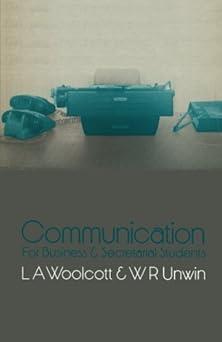Read the following passage and then answer the questions below. Can a man think without using some
Question:
Read the following passage and then answer the questions below.
Can a man think without using some form of words? This is a very old question to which the short and simple answer is 'Yes, he can'. A man can think in images alone, without words; in diagrams and models, in gestures, as in using the deaf and dumb alphabet; and even rarely in muscular movements.
If, while completely absorbed in some task, you hear the clanging bell of a fire engine in the distance, you may perhaps see the image of a house ablaze with the mind's 'inward eye' without ever thinking or enunciating the vocable 'Fire!' and without allowing yourself to be deflected for one split second from what you are doing. Nevertheless, in spite of all that the
'behaviourists' may say, a human being is never a purely sensitive creature For one thing, an entirely sensitive being cannot err. 'Only thinkers are capable of so distinguished an achievement as making a mistake.'
A man can think in more ways than one, but thought normally implies the use of verbal symbols. Even so, the process of symbolisation remains surprisingly incomplete. Twentieth-century novelists, like Dorothy Richardson, Virginia Woolf, and James Joyce, have displayed in their different ways that 'stream of consciousness' which flows continuously through our waking minds by day and intermittently through our sleeping brains by night in the strange uncertainty of dreams. On its surface that stream may carry many truncated linguistic structures, immediately expressive, but syntactically inconsequential and incoherent. Purposeful and ordered thought, or conceptual cognition, is hard work. To marshal all the available evidence in support of a proposition, to arrange that evidence logically so as to distinguish the main features from the subordinate ones and to select the relevant ones from the irrelevant; to state lucidly the implications of the evidence; to weigh those (perhaps conflicting) implications in the scale of probability; and finally to pronounce the verdict calmly and dispassionately - all this demands a competent manipulation of verbal symbols. Words are symbols and a language is a system of such arbitrary symbols by means of which people communicate with one another. Words in sequence convey meaning or signification. Meaning may be defined as a complex series of relations or correspondences between linguistic symbols and the world of human experience which they represent.
Simeon Potter, Language in the Modern World
(a) Define briefly the meaning of the following expressions, as used in the passage:
enunciating truncated inconsequential conceptual cognition arbitrary.
(b) Explain, in your own words, the passage 'For one thing, an entirely sensitive being cannot err. "Only thinkers are capable of so distinguished an achievement as making a mistake."'
(c) What is meant by the expression 'stream of consciousness'?
(d) List in your own words the processes described in the passage 'To marshal all the available evidence ... calmly and dispassionately.'
Step by Step Answer:

Communication For Business And Secretarial Students
ISBN: 9780333261750
1st Edition
Authors: Lysbeth A Woolcott, Wendy R Unwin






